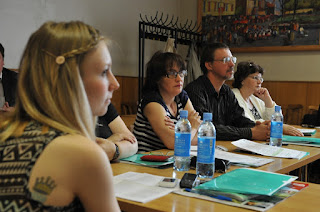World-level Arctic ocean
research, cultivation of high-value seafood for the top restaurants in St
Petersburg and beyond, compounds for ecological cosmetics and a total
disconnection from the hectic urban life, staged in the midst of amazingly rich
bio- and geodiversities at one side of the coin – extensive challenges posed by
logistics, energy production and the Arctic climate on the other. These are
some of the main discoveries made by the nine “AQUAREL - Aquatic Resources for
Green Energy Realisation” (KA397) project’s Finnish and Russian representatives
on the project’s White Sea trip 3rd-6th June 2013.
The trip was initiated
and hosted by Mr Alexander Pozin from the AQUAREL partner “Mariproduct” JSC.
Mariproduct produces mussels, fish and other marine-based products like
cosmetics ingredients and offers also services for tourists. The company runs
the Marine Farm “Sonostrov” on the island of Tonisoar which is located in the
Louhi Region, about 70 km south-east from the village of Chupa. Although
accessible from mainland by foot, the distance to the island has to be covered
by boats from Chupa due to the lack of roads to more proximate locations.
Mr Alexander Pozin, director of “Mariproduct” JSC
The main goal of the AQUAREL
trip was to deepen the project partners’ understanding on the offerings, circumstances,
challenges and possibilities provided by the White Sea and this particular
remote location. Corresponding with the project’s main theme, of a special
interest for the consortium were the challenges that such isolated, peripheral
locations face with energy production and modern solutions for them. The
solutions that are applied should enable both electricity and heat production
by maximizing the use of local, easy-to-access and environmentally-friendly resources
in a sustainable manner. Now having the very practical insight into the
conditions and resources available, AQUAREL experts will continue studying the
potential embedded in the utilization of, amongst others, storm-cast algae
found on the White Sea shores in large quantities. Also the project’s
investigations for other innovative biomaterial based solutions applicable to
decentralized energy production at peripheral locations will be continued in
Finnish-Russian research and business collaboration.

Mussels harvesting at Tonisoar
The AQUAREL project is a collaborative initiative
of 3 Finnish and 5 Russian organisations. It focuses on developing energy
production from fish waste and aquatic biomaterials, thus reducing the load on
ecosystem and providing novel possibilities for creating energy and additional
income for fish farms and fish processors in the Republic of Karelia and in
Finland. The project started in October 2012 and will last for 20 months.
The project’s main outcomes reached in the
project by June 2013 are:
- Increased interest towards fish waste
utilisation amongst fish farmers and fish processors
- Report on fish waste production locations and
quantities in the Republic of Karelia
- Study on the equipment applicable to fish
waste processing in Karelia
- Active collaboration and contacts with fish
farms and fish processing plants in Karelia
- Started: Study on White Sea algae utilisation
and energy production possibilities
- Studies on the energy potential of different
biobased materials available in the Republic of Karelia
- Active collaboration between the project
partners, including plans for novel collaboration initiatives and partnerships
The AQUAREL crew





